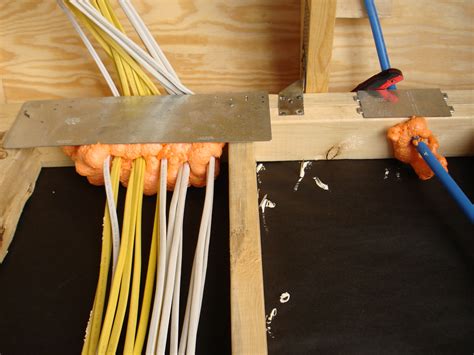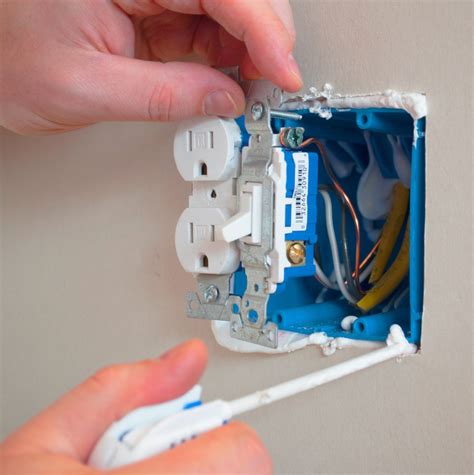can i seal holes inside electrical boxes If you have any boxes you can access from behind, you can use the orange fire stop spray foam. There is also a product out there that is sold as small square sheets of reddish clay-like material. It’s a putty that can be . While there are dozens of ways to join together two pieces of wood, many rely on screws to hold them together. One method is to directly screw them together, while another method involves using brackets to do so.
0 · sealing electrical wiring holes
1 · sealing electrical wiring
2 · sealing electrical boxes
3 · seal holes in electrical box
4 · how to air seal electrical box
5 · electrical sealing holes
6 · air sealing wiring holes
7 · air sealing electrical box installation
CNC stands for Computer Numerical Control. This term can refer to a computer-based system that controls the motion of machine tools (machines) such as lathes and milling machines. In other words, it controls the machine tool’s ability to perform cutting or grinding operations.
If you have any boxes you can access from behind, you can use the orange fire stop spray foam. There is also a product out there that is sold as small square sheets of reddish clay-like material. It’s a putty that can be .Air can pass through tiny gaps around electrical wiring and holes in electrical boxes, carrying conditioned air into wall cavities and up into unconditioned attics or allowing air from .
This blog provides guidance on the best practices for air-sealing electrical boxes, outlining key tips and recommending reliable products suited for the job. With the right materials and .

Seal around installed wiring using caulk or canned spray foam. For ceiling-mounted electrical boxes, install the electrical box in the ceiling drywall, then caulk around the base and caulk all holes in the box with fire-retardant caulk. And one of the easiest things you can do is to air seal your electrical boxes. The other half of it, and some would argue the most important half, is that you must air seal the walls/ceiling.
If you have any boxes you can access from behind, you can use the orange fire stop spray foam. There is also a product out there that is sold as small square sheets of reddish clay-like material. It’s a putty that can be squished around a . Air sealing the holes inside an electrical box: silicone caulk, every time. Air sealing the gap around an electrical box: silicone caulk for gaps below 1/4″, or in high temps. Otherwise, spray foam.
sealing electrical wiring holes
Gaps around ceiling boxes must be sealed with an intumescent fireblocking caulk or foam. Ordinary spray foam burns too quickly, opening the gap and creating a chimney effect that feeds the fire. Intumescent caulk or foam, on the other hand, swells when heated so it prevents that airflow.

Air can pass through tiny gaps around electrical wiring and holes in electrical boxes, carrying conditioned air into wall cavities and up into unconditioned attics or allowing air from unconditioned garages and crawlspaces into living spaces.This blog provides guidance on the best practices for air-sealing electrical boxes, outlining key tips and recommending reliable products suited for the job. With the right materials and techniques, you can effectively air-seal electrical boxes and minimize air leakage.
Seal around installed wiring using caulk or canned spray foam. For ceiling-mounted electrical boxes, install the electrical box in the ceiling drywall, then caulk around the base and caulk all holes in the box with fire-retardant caulk.
And one of the easiest things you can do is to air seal your electrical boxes. The other half of it, and some would argue the most important half, is that you must air seal the walls/ceiling.
sealing electrical wiring
If you’re stuck with K&T and have, or can safely add, a plastic junction box, you can at least air seal the perimeter of the box. I personally would also be comfortable air sealing the gaps and penetrations inside the box in low-load, low-temperature applications such as switches and receptacles.
Try spraying foam AROUND the box, and, if need be, through the holes in the box (from the inside) so that you can seal the holes and around the cables coming in.Electrical outlets can let in unwanted airflow, driving up your energy bills and while bringing comfort down. However, with Great Stuff™ and Great Stuff Pro™ products, sealing them can be quick and easy. Materials. Prep area by removing dust and debris. Shake can for 60 seconds. Install the dispenser to the product as per directed on the label.
If you have any boxes you can access from behind, you can use the orange fire stop spray foam. There is also a product out there that is sold as small square sheets of reddish clay-like material. It’s a putty that can be squished around a . Air sealing the holes inside an electrical box: silicone caulk, every time. Air sealing the gap around an electrical box: silicone caulk for gaps below 1/4″, or in high temps. Otherwise, spray foam.
Gaps around ceiling boxes must be sealed with an intumescent fireblocking caulk or foam. Ordinary spray foam burns too quickly, opening the gap and creating a chimney effect that feeds the fire. Intumescent caulk or foam, on the other hand, swells when heated so it prevents that airflow.Air can pass through tiny gaps around electrical wiring and holes in electrical boxes, carrying conditioned air into wall cavities and up into unconditioned attics or allowing air from unconditioned garages and crawlspaces into living spaces.
This blog provides guidance on the best practices for air-sealing electrical boxes, outlining key tips and recommending reliable products suited for the job. With the right materials and techniques, you can effectively air-seal electrical boxes and minimize air leakage.Seal around installed wiring using caulk or canned spray foam. For ceiling-mounted electrical boxes, install the electrical box in the ceiling drywall, then caulk around the base and caulk all holes in the box with fire-retardant caulk. And one of the easiest things you can do is to air seal your electrical boxes. The other half of it, and some would argue the most important half, is that you must air seal the walls/ceiling. If you’re stuck with K&T and have, or can safely add, a plastic junction box, you can at least air seal the perimeter of the box. I personally would also be comfortable air sealing the gaps and penetrations inside the box in low-load, low-temperature applications such as switches and receptacles.
sealing electrical boxes
Try spraying foam AROUND the box, and, if need be, through the holes in the box (from the inside) so that you can seal the holes and around the cables coming in.

metal fabricators kentucky
metal fabricators lafayette lafayette la
Sheet metal gauge is a fundamental measurement in metalworking that denotes the thickness of sheet metal. Originating from the Browne & Sharpe system in North America, gauge is a standardized unit used to specify the thickness of metal sheets, plates, and wire.What thickness or gauge is standard automotive sheetmetal on American vehicles, such as a door skin or fender skin. I'm practicing up on my Mig and am trying to determine settings, using ER70-6S and C25. The tables in my texts and on the machine reference .
can i seal holes inside electrical boxes|electrical sealing holes